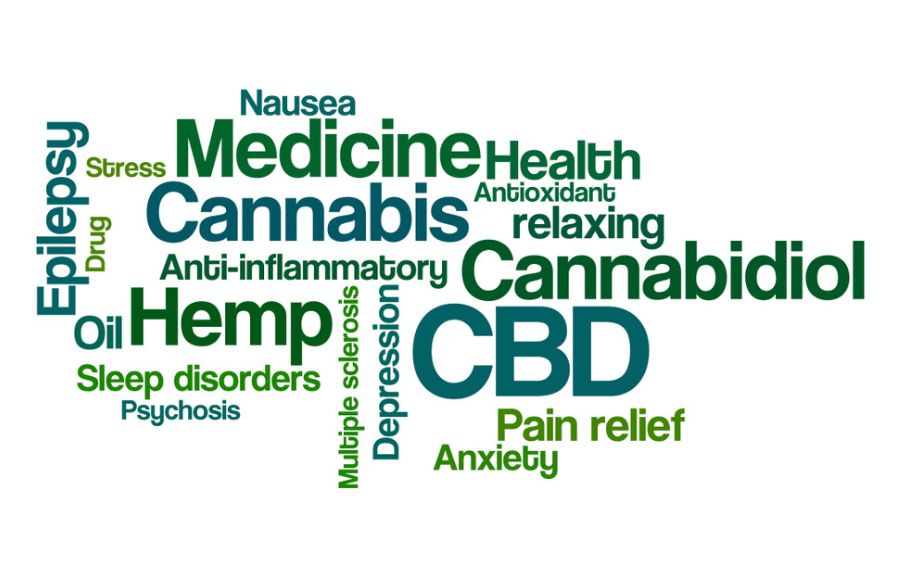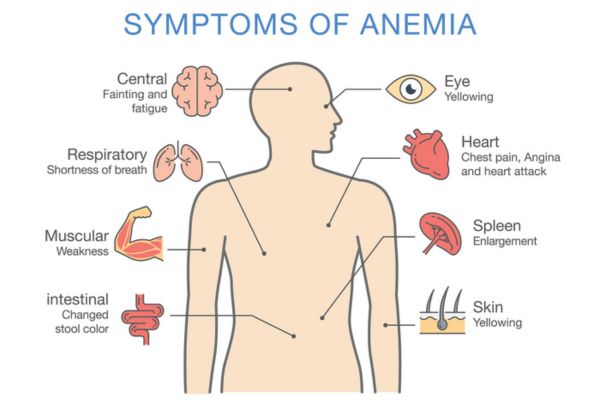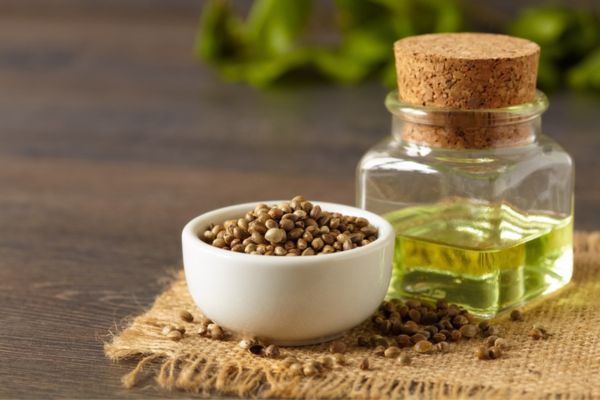The Definitive Guide to Hemp: Your Solution for Anemia

Do you often find yourself feeling drained of energy and struggling with the symptoms of anemia? Imagine a natural solution that could potentially alleviate your discomfort and boost your vitality. Enter hemp, a versatile plant known for its myriad health benefits, including its potential to help manage anemia effectively.
In our comprehensive blog, "The Definitive Guide to Hemp: Your Solution for Anemia," we delve into the fascinating world of hemp and explore its potential in addressing the challenges posed by anemia. Here's a sneak peek at what awaits you:
Understanding the link between hemp and anemia: Uncover the mechanisms through which hemp may offer relief from anemia symptoms.
Exploring hemp-derived nutrients: Discover the essential vitamins and minerals in hemp that could play a crucial role in combating anemia.
Practical tips for incorporating hemp into your daily routine: Learn how to integrate hemp products into your diet to harness their potential benefits for anemia management.
Join us on this enlightening journey as we unlock the secrets of hemp and its promising role in improving your well-being. Say goodbye to anemia-related struggles and embrace a natural, holistic approach with hemp as your ally.
Short Summary
- Hemp offers potential relief from anemia symptoms through its beneficial properties.
- Essential nutrients in hemp can aid in combating anemia, providing a natural solution for vitality.
- Learn how to incorporate hemp into your daily routine effectively for anemia management.
- Discover how hemp seed oil can play a crucial role in enhancing iron absorption to address anemia effectively.
1. Understanding Anemia
Anemia is a condition characterized by a lack of healthy red blood cells to carry adequate oxygen to the body's tissues. There are various types of anemia, with iron deficiency anemia being one of the most common. Let's delve deeper into what anemia is all about:
What is Anemia?
Anemia occurs when there is a decrease in the number of red blood cells or if the red blood cells don't have enough hemoglobin. Hemoglobin is an iron-rich protein that helps red blood cells carry oxygen from the lungs to the rest of the body.
Types of Anemia
Iron Deficiency Anemia: This type of anemia is caused by a deficiency of iron in the body, which is essential for the production of hemoglobin.
Sickle Cell Anemia: An inherited form of anemia where red blood cells become rigid and sticky, taking on a crescent shape.
Vitamin Deficiency Anemia: Caused by a lack of essential vitamins like vitamin B12 and folate, necessary for red blood cell production.
Symptoms and Causes
Symptoms of anemia can vary depending on the type and severity but may include fatigue, weakness, shortness of breath, and dizziness. Causes of anemia can range from insufficient dietary intake of iron to chronic conditions like internal bleeding or underlying health issues.
Importance of Diagnosis
It's crucial to consult a healthcare provider if you suspect you have symptoms of anemia. A proper diagnosis through blood tests and medical history evaluation can help determine the type and underlying cause of anemia, leading to appropriate treatment.

2. Importance of Iron for Red Blood Cells
Iron plays a crucial role in the production of red blood cells, which are responsible for carrying oxygen throughout the body. Without enough iron, the body cannot produce an adequate amount of these essential cells, leading to a condition known as iron deficiency anemia. This condition can cause fatigue, weakness, and overall decreased energy levels.
The Process of Iron Absorption
- Heme vs. Non-Heme Iron:
Heme iron, found in animal products, is more easily absorbed by the body compared to non-heme iron found in plant-based foods.
- Factors Affecting Iron Absorption:
Vitamin C enhances iron absorption, while calcium-rich foods like dairy products may inhibit it. Consuming heme iron with non-heme iron sources can improve overall iron absorption.
Symptoms of Iron Deficiency Anemia
Common Symptoms:
Fatigue
Weakness
Shortness of breath
Pale skin
Dizziness
Severe Symptoms:
Irregular heartbeat
Chest pain
Cold hands and feet
Quoting Expert Insights
According to the American Society of Hematology, "Iron deficiency anemia is a common type of anemia that occurs when the body does not have enough iron. Iron is needed to make hemoglobin, the part of red blood cells that carries oxygen.”
3. The Role of Hemp Seed Oil in Anemia
Anemia is a condition characterized by a decrease in the total amount of red blood cells or hemoglobin in the blood, leading to symptoms such as fatigue, weakness, and shortness of breath. Various types of anemia exist, with iron deficiency anemia being one of the most common, caused by a lack of iron in the body necessary for red blood cell production.
Understanding Iron Deficiency Anemia
Iron deficiency anemia occurs when there isn't enough iron in the body to produce adequate hemoglobin, a protein present in red blood cells that carries oxygen. This deficiency can result from a variety of factors, including insufficient dietary intake of iron, blood loss due to internal bleeding or chronic conditions, or poor iron absorption. It's essential to address iron deficiency anemia promptly to prevent complications and improve overall well-being.
The Significance of Hemp Seed Oil
Hemp seed oil has gained attention for its potential role in managing anemia, particularly iron deficiency anemia. Hemp seeds are a rich source of nutrients, including essential fatty acids, proteins, vitamins, and minerals. Additionally, hemp seed oil contains high levels of iron, making it a valuable dietary supplement for individuals struggling with iron deficiency.
Key Components Beneficial for Anemia
Iron: Hemp seed oil provides a bioavailable form of iron that can support red blood cell production and combat iron deficiency anemia.
Vitamin C: Pairing hemp seed oil with vitamin C-rich foods can enhance iron absorption, optimizing its utilization in the body.
Fatty Acids: The omega-3 and omega-6 fatty acids present in hemp seed oil contribute to overall cardiovascular health and red blood cell function.
Incorporating Hemp Seed Oil into Your Diet
To benefit from hemp seed oil's potential in managing anemia, consider incorporating it into your daily diet. You can drizzle hemp seed oil over salads, blend it into smoothies, or use it as a dressing for cooked dishes. Combining hemp seed oil with foods rich in vitamin C and iron can maximize its efficacy in addressing iron deficiency anemia.
4. Iron Absorption and Hemp Seed Oil
Iron absorption is a critical process for individuals with iron deficiency anemia. Hemp seed oil can play a significant role in improving the absorption of iron due to its unique nutritional composition. Here's how hemp seed oil can enhance iron absorption and potentially alleviate symptoms of anemia:
Benefits of Hemp Seed Oil:
Hemp seed oil is rich in omega-3 and omega-6 fatty acids, making it a valuable addition to the diet for individuals struggling with iron deficiency. These fatty acids support overall health and may aid in better absorption of essential nutrients like iron.
Vitamin E Content:
Hemp seed oil is also a good source of vitamin E, which acts as an antioxidant and can help protect red blood cells from damage. Healthy red blood cells are crucial for ensuring optimal oxygen transport and overall well-being.
Combining Hemp Seed Oil with Iron-Rich Foods:
Consuming hemp seed oil alongside iron-rich foods such as leafy green vegetables, legumes, and lean meats can further enhance iron absorption. The synergy between hemp seed oil and these nutrient-dense foods can promote better overall iron levels in the body.
Heme vs. Non-Heme Iron:
Hemp seed oil contains non-heme iron, which is the plant-based form of iron. While non-heme iron may not be as readily absorbed as heme iron found in animal products, the presence of vitamin C in hemp seed oil can enhance the absorption of nonheme iron.
Medical Considerations:
It's important to consult a healthcare provider before making significant dietary changes, especially for individuals with existing health conditions or specific nutrient requirements. A healthcare professional can provide personalized guidance on incorporating hemp seed oil into a balanced diet tailored to individual needs.

5. Managing Iron-Deficiency Anemia with Hemp
Iron-deficiency anemia is a common condition that occurs when the body doesn't have enough iron to produce an adequate amount of red blood cells. Managing this condition effectively is crucial for overall health and well-being. Hemp, particularly hemp seed oil, can be a valuable addition to your diet to help combat iron-deficiency anemia. Let's explore how hemp can play a role in managing this condition effectively.
The Role of Hemp Seed Oil in Boosting Iron Levels
Hemp seed oil is a rich source of nutrients, including iron, that can help increase the body's iron levels. Incorporating hemp seed oil into your daily diet can provide a natural and plant-based way to boost your iron intake. The iron present in hemp seed oil supports the production of red blood cells, helping to alleviate symptoms of iron-deficiency anemia such as fatigue and weakness.
Enhancing Iron Absorption with Hemp
In addition to being a source of iron itself, hemp seed oil can also help enhance the absorption of iron from other sources in your diet. The presence of vitamin C in hemp seed oil aids in the absorption of non-heme iron, the type of iron found in plant-based foods. By combining hemp seed oil with iron-rich foods like leafy greens, legumes, and nuts, you can optimize your body's ability to absorb and utilize iron effectively.
Incorporating Hemp into a Balanced Diet for Anemia Management
Including hemp seed oil in a well-rounded, healthy diet is key to managing iron-deficiency anemia. Pairing hemp seed oil with foods high in iron, such as leafy vegetables and legumes, can create a nutrient-dense meal that supports optimal iron levels. Be sure to consult your healthcare provider before making any significant changes to your diet, especially if you're pregnant or have underlying health conditions.
6. Hemp Seed Oil vs. Other Supplements for Anemia
Hemp Seed Oil:
Hemp seed oil is a popular natural supplement known for its rich nutritional profile. It contains essential fatty acids, vitamins, and minerals, making it a valuable addition to a balanced diet for individuals looking to support their overall health and well-being.
Benefits of Hemp Seed Oil for Anemia:
- Rich in Iron: Hemp seed oil is a good source of iron, a vital mineral needed for red blood cell formation and oxygen transport in the body.
- Vitamin E Content: Vitamin E in hemp seed oil acts as an antioxidant, protecting red blood cells from oxidative stress and promoting their longevity.
- Omega-3 and Omega-6 Fatty Acids: These essential fatty acids play a crucial role in maintaining healthy cell membranes and supporting proper blood circulation.
Comparison with Other Supplements:
Iron Supplements:
While iron supplements are commonly prescribed for iron deficiency anemia, some individuals may experience digestive issues such as constipation or upset stomach.
In contrast, hemp seed oil usually does not cause these gastrointestinal side effects, providing a gentler option for individuals with sensitive stomachs.
Vitamin C Supplements:
Vitamin C enhances iron absorption from plant-based sources like hemp seed oil by converting non-heme iron into a more absorbable form.
Combining hemp seed oil with vitamin C-rich foods like citrus fruits can optimize iron uptake in the body, promoting better overall iron levels.
CBD Oil:
CBD oil is a trending supplement known for its anti-inflammatory properties and potential benefits for managing chronic conditions.
While CBD oil can support overall health and well-being, it does not directly address iron deficiency anemia as hemp seed oil does.
7. Incorporating Hemp Seed Oil into a Healthy Diet
Hemp seed oil is a powerhouse of nutrients that can be beneficial for individuals dealing with various forms of anemia. By incorporating hemp seed oil into your daily diet, you can supplement your body with essential nutrients that promote red blood cell production and help combat iron deficiencies.
Benefits of Hemp Seed Oil for Anemia
Rich in Iron: Hemp seed oil contains iron, a crucial mineral for the production of hemoglobin in red blood cells. Hemoglobin helps transport oxygen throughout the body, ensuring optimal cellular function.
High in Vitamin C: Vitamin C present in hemp seed oil aids in the absorption of nonheme iron, enhancing its utilization by the body. This synergistic combination boosts iron levels effectively.
Recipes for Hemp Seed Oil Infusions
- Hemp Seed Oil Salad Dressing: Blend hemp seed oil with lemon juice, Dijon mustard, and honey for a flavorful dressing rich in iron and vitamin C.
- Hemp Seed Oil Smoothie: Add a dose of hemp seed oil to your favorite fruit smoothie for a nutritious boost that supports healthy blood cell production.
8. Hemp Seed Oil for Pregnant Women with Anemia
Pregnancy is a delicate period that requires special attention to ensure both the mother and baby's health. Anemia, particularly iron deficiency anemia, is a common concern during pregnancy due to increased blood volume requirements. Hemp seed oil can be a beneficial addition to the diet of pregnant women dealing with anemia.
The Role of Hemp Seed Oil in Boosting Iron Levels
Hemp seed oil is a rich source of nutrients, including iron, which is essential for maintaining healthy red blood cell production. The iron present in hemp seed oil is in the form of non-heme iron, which can help address iron deficiencies in pregnant women with anemia. Adding hemp seed oil to the diet can support the body in increasing iron levels, mitigating the risk of complications associated with anemia.
Enhancing Iron Absorption with Hemp Seed Oil
In addition to providing iron, hemp seed oil contains essential fatty acids that support better absorption of nutrients, including iron. The presence of healthy fats in hemp seed oil can aid in optimizing the body's utilization of iron from dietary sources, further assisting pregnant women in overcoming iron deficiency anemia.
Incorporating Hemp Seed Oil into a Healthy Diet Plan
Pregnant women with anemia can benefit from incorporating hemp seed oil into their daily diet. Whether used in salad dressings, smoothies, or as a cooking oil, hemp seed oil offers a versatile and nutritious way to boost iron levels naturally. Combining hemp seed oil with iron-rich foods such as leafy green vegetables, beans, and lean meats can create a well-rounded meal plan to support iron absorption and overall health during pregnancy.
Consulting a Healthcare Provider
While hemp seed oil can be a valuable addition to a pregnant woman's diet, it is important to consult with a healthcare provider before making any significant dietary changes. Healthcare professionals can provide personalized guidance on incorporating hemp seed oil safely and effectively to address anemia symptoms and promote overall well-being during pregnancy.

9. Enhancing Iron Absorption with Carrier Oils
Iron absorption is a crucial aspect of managing iron deficiency anemia effectively. Many individuals with this condition struggle to absorb sufficient iron from their diets due to various factors. One effective strategy to enhance iron absorption is through the utilization of carrier oils in meal preparation and consumption.
Benefits of Carrier Oils in Iron Absorption:
Facilitating Absorption: Carrier oils play a vital role in helping the body absorb essential nutrients, including iron, more efficiently. They can increase the bioavailability of iron, making it easier for the body to utilize this important mineral.
Pairing with Iron-Rich Foods: When cooking meals rich in heme or non-heme iron sources such as leafy greens, legumes, and red meat, incorporating carrier oils can enhance the overall absorption of iron from these foods.
Choosing the Right Carrier Oils:
Olive Oil: Known for its health benefits, olive oil is a common choice as a carrier oil. It contains monounsaturated fats that promote cardiovascular health in addition to aiding in the absorption of nutrients like iron.
Coconut Oil: Coconut oil is rich in medium-chain triglycerides (MCTs) which are easily digestible and support nutrient absorption. It can be a flavorful addition to various dishes while boosting the bioavailability of iron.
Flaxseed Oil: Flaxseed oil is a plant-based source of omega-3 fatty acids, offering a vegan-friendly option to enhance iron absorption. It adds a nutty flavor to dishes and contributes to overall cardiovascular health.
10. Consultation with Healthcare Providers for Anemia Symptoms
When dealing with symptoms of anemia, it is essential to seek guidance from healthcare providers who specialize in treating this condition. Consulting with medical professionals can provide valuable insights and personalized recommendations to address the underlying causes of anemia and improve your overall well-being. Here are key considerations when seeking consultation for anemia symptoms:
Importance of Medical Evaluation: Schedule an appointment with your healthcare provider for a thorough evaluation of your symptoms, medical history, and potential risk factors associated with anemia.
Diagnostic Tests: Your healthcare provider may recommend specific diagnostic tests to determine your iron levels, red blood cell count, and overall health status to accurately diagnose the type and severity of anemia.
Treatment Options: Based on the diagnostic results, your healthcare provider can recommend suitable treatment options, which may include dietary changes, iron supplements, or other interventions tailored to your individual needs.
Monitoring Progress: Regular follow-up appointments with your healthcare provider are crucial to monitor your progress, adjust treatment plans as needed, and ensure that your iron levels are improving effectively.
Lifestyle Modifications: Healthcare providers can offer guidance on adopting a healthy lifestyle to support iron absorption, such as including iron-rich foods like leafy greens, lean meats, and fortified cereals in your diet.
Supplement Recommendations: Your healthcare provider may suggest specific iron supplements or vitamin C, which can enhance iron absorption and help alleviate symptoms of iron-deficiency anemia.
Addressing Underlying Health Issues: If anemia is caused by underlying health conditions or chronic diseases, it is vital to address these issues with the guidance of healthcare professionals to manage the condition effectively.
Avoid Self-Diagnosis: It is crucial not to self-diagnose or self-treat anemia symptoms without consulting healthcare providers, as improper management can lead to adverse health effects and complications.
Holistic Approach: Emphasize the importance of a holistic approach to managing anemia, which includes medical treatment, dietary modifications, lifestyle changes, and ongoing support from healthcare professionals.
Patient Education: Healthcare providers play a key role in educating patients about anemia, its potential causes, treatment options, and preventive measures to empower individuals in managing their condition effectively.
By collaborating with knowledgeable healthcare providers, individuals can receive comprehensive care, accurate diagnosis, and personalized treatment plans to address anemia symptoms effectively and enhance their overall well-being.
Conclusion
In conclusion, hemp emerges as a promising solution for managing anemia naturally, offering a wealth of nutrients and therapeutic benefits. Its iron and vitamin content can potentially alleviate symptoms and improve overall well-being. By incorporating hemp into your diet or lifestyle, you can explore a holistic approach to address anemia effectively. Furthermore, the versatility of hemp products opens up a world of possibilities for culinary and wellness applications. From hemp seeds to CBD oil, there are numerous ways to integrate this powerhouse ingredient into your daily routine. Embrace the benefits of hemp and discover a sustainable, natural remedy for anemia. Ready to harness the potential of hemp for combating anemia? Start incorporating hemp products into your routine today and experience the difference for yourself. Take the first step towards holistic
FAQ
Can pregnant women use hemp seed oil for anemia?
Hemp seed oil is a great source of iron and other essential nutrients, making it a safe and natural option for pregnant women suffering from anemia. However, it is always recommended to consult with a healthcare professional before adding any new supplements to your diet during pregnancy.
How does iron deficiency cause anemia?
Iron deficiency is the most common cause of anemia. This is because iron is essential for the production of hemoglobin, the protein in red blood cells that carries oxygen throughout the body. Without enough iron, the body cannot produce enough healthy red blood cells, leading to anemia.
How does hemp seed oil compare to other supplements for anemia?
Hemp seed oil contains high levels of iron, which is an essential nutrient for treating anemia. Compared to other supplements, hemp seed oil is a natural and sustainable option, making it a popular choice among those looking for a more holistic approach to managing anemia. Additionally, hemp seed oil is rich in other essential vitamins and minerals, making it a more well-rounded and beneficial supplement for overall health.
What is anemia?
Anemia is a medical condition in which the body does not have enough healthy red blood cells to carry oxygen to the tissues. This can lead to fatigue, weakness, and other symptoms. Hemp has been shown to be an effective natural solution for treating anemia, providing the body with essential nutrients and promoting healthy blood cell production.
What is the role of hemp seed oil in managing anemia?
Hemp seed oil is rich in essential fatty acids and amino acids, making it a valuable dietary supplement for managing anemia. These nutrients help increase red blood cell production and improve oxygen circulation, leading to better energy levels and overall health. Additionally, hemp seed oil contains iron, which is essential for the production of hemoglobin, the protein responsible for carrying oxygen in the blood. Overall, incorporating hemp seed oil into your diet can help manage anemia and improve your overall well-being.
